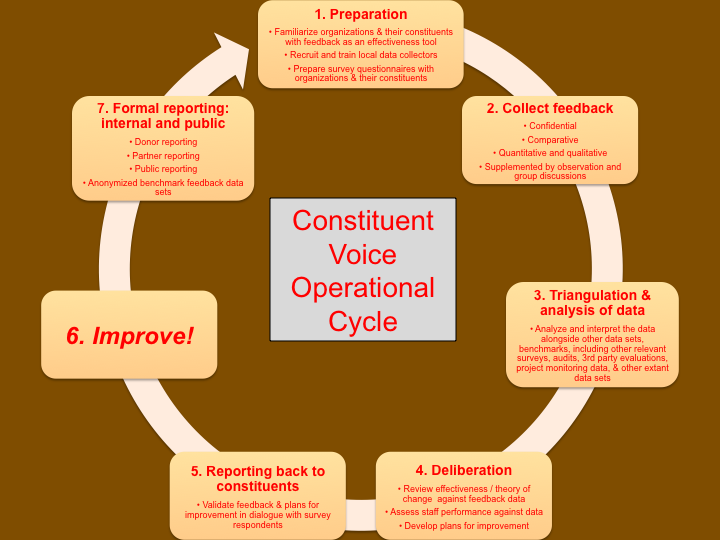Keystone works with organisations to generate powerful feedback systems based on how their constituents perceive their work.
Organisations gain significant benefits from implementing feedback systems:
- New insights about the impact of work on constituents. This can be benchmarked against the performance of peer organisations.
- Renew and strengthen relationships with all constituents on the basis of independent data.
- Empower primary constituents by amplifying their voices.
- Create a ‘constituent-focused’ culture in the organization.
- Create opportunities for mutual learning to improve approaches and strategies.
- Strengthen legitimacy as a result of visible efforts to be more accountable to constituents.
Constituent Voice Operational Cycle
Typically, designing and implementing a feedback system involves the following steps:
- Preparation: Agree to goals and terms with all partners
- Finalize & Run Surveys: Design independent and confidential surveys across key constituents
- Triangulate with other Evaluative Thinking and Data: Collect other relevant surveys, audits, and analyses
- Analysis: Analyze effectiveness and theory of change against the feedback data
- Reporting Back to Survey Respondents: Validate feedback and plans for improvement in generative dialogue with constituents
- Funder & Public Reporting: Public and donor reporting by the nonprofits, including data plus what constituents say about their feedback
We provide 3 types of feedback services:
| Type | Who is surveyed | On what |
|---|---|---|
| Feedback from primary constituents Examples |
Primary constituents – the people most affected |
Quality of relationships, perceived performance and impact of organisations. Survey Techniques: May vary from participatory exercises to exit polls to using mobile phones |
| Feedback from grantees/investors Examples |
Grantees/investors funds recipients |
Quality of relationships, perceived performance and impact of grantmaker/ funder / social investor Survey Techniques: Usually written surveys online and on paper |
| Feedback from other constituents Examples |
Partners/ members/ policy makers/ others |
Quality of relationships, perceived performance and impact of International NGOs, networks or other organisations Survey Techniques: Usually written surveys online and on paper |
- Read more about our approach to feedback and Constituent Voice.
- Download our feedback systems brochure.
- Read other approaches to feedback systems
- Read our Good practice principles
Feedback systems raise significant ethical issues. Badly implemented, feedback systems can generate misleading data for decision makers and worsen power imbalances among farmers. Download our ethical framework for feedback exercises.

